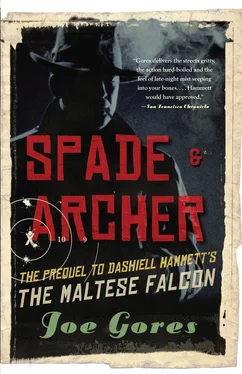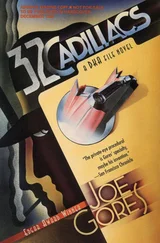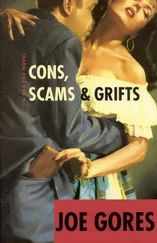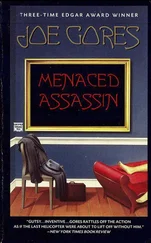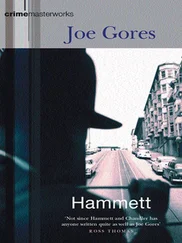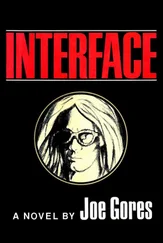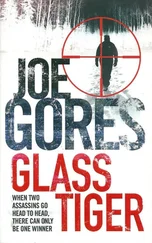“I don’t do domestic,” said Spade almost automatically.
A dismissive gesture with her cigar. “I was not seeking grounds for divorce. I was defending my position as wife. I abandoned the idea for two reasons. First, I had a very good life even if there was no love left in it. Second, I came to realize that whatever decision Collin had been struggling with during the past year was related to business, not to his private affairs. Then, in quick order, he took out a huge insurance policy with me as beneficiary. Then he died. Then he was suddenly reputed to have been ruined financially.”
“Was he?”
“I have no idea. When the innuendo began about poison and suicide or, worse, murder, I realized that if he indeed had been ruined financially, suicide was possible and I might be denied the insurance money. Without that money I will lose everything I value. A life of ease. This house. My social position. Everything.”
“No idea who the mistress was?”
“None. She was surely not of our circle.” The thin lips twisted in a sudden, almost startling sneer. “I need you to find her. If he was in love with her, wouldn’t that make suicide much less likely? I will pay you of course.”
Spade stood, stubbed out his cigar in the ashtray. “Get me access to your husband’s records at the bank and I’ll find your mistress for you. She’ll be somewhere in his papers. Canceled checks paid to her, department store bills, a love nest somewhere, weekends at a Sonoma resort.”
“Impossible.” For the first time she rose. In the two-inch heels on her chic black patent leather shoes she was only some two inches shorter than Spade’s six-foot-and-a-fraction-inch height. “Not because I refuse. Because the bank insists his financial records cannot be viewed.”
“Not even by his widow?”
“Sometimes I think especially not by his widow.”
“Well, there are ways.” As if it were an afterthought he asked, “Did your husband have a friend, business aquaintance, what have you, who was about my age, dark hair, piercing eyes, built like a tennis player but with small, almost delicate hands and feet, maybe something of the dancer about him?”
She stood frowning, head cocked slightly in thought.
“Such a man was here one evening with Collin, in this room, for an hour or more. Just the one time, maybe a week before my husband’s death. There were raised voices, but that was all.”
“You couldn’t hear anything that was said?”
“I do not snoop at doors, Mr. Spade. Is he important?”
“Darned if I know. Probably not. But he was in the group at the Neptune Bath House that day. If your husband was trying to make some financial decision, this man might play into it.” He made an irritated gesture. “I need to get into those bank files, Mrs. Eberhard. I know a good attorney.”
“It’s in my interest that you see them, but the bank says no. In the face of that refusal I’m afraid to do anything that might hinder my getting the insurance money.”
“If you change your mind...”
She gave him her hand. A firm grip, warm fingers. “I will surely let you know,” she said.
It was 2:55, five minutes before the official end of banking hours, when Spade went between flanking Doric pillars and through the inset decorative doorway of California-Citizens Bank at 832 California. Below the bank, at Grant, was Old St. Mary’s Church; above it, on Powell Street at the crest of the hill, the Fairmont Hotel. A streetcar slowly climbed past, its wheels clacking on the tracks.
Inside to the left, behind a cast-iron divider decorated with the figure of a miner panning for gold, was a desk with no one behind it and no papers upon it. Its brass plaque read:
VICTOR SPAULDING
Vice President
Spade stood in line at the only teller’s window that was still open. By the time Spade’s turn had come an elderly uniformed bank guard had locked the front door and was letting out the last few patrons.
Spade told the teller, “I would like to speak with Vice President Spaulding concerning the bank’s late president.”
He was a slender youth with sandy hair that obviously resisted all efforts to tame it. He let his eyes slide sideways.
“Mr. Spaulding doesn’t seem to be at his desk. He may be gone for the night.”
“I have an appointment.”
Spade sat down in the armchair facing Spaulding’s desk. The youth fidgeted, closed his window, went through a door behind the cages, shutting it behind him. Spade heard the sound of an elevator. Five minutes later the teller returned, started closing out his cash drawer while managing not to look at Spade.
Two minutes after that a man in his forties came through the doorway behind the teller. He was of medium height, round faced, clean-shaven, nervous handed, slightly stoop shouldered, with receding black hair and a pince-nez on a cord fastened to his lapel buttonhole.
Spade stood, hand out. “Samuel Spade.”
Spaulding took his hand very briefly, gave it a single shake, released it. His hand was soft, moist, short fingered. He sat down behind his desk as if it were a bastion.
“I do not recall any appointment with anyone named Spade.”
Spade laid one of his business cards on the desk.
Spaulding read it, began shaking his head slowly. Perspiration shone on his forehead. His narrow mouth had gotten more and more pursed, as if he were tasting a lemon.
Spade said, “I have been hired to arrange a time when Mr. Eberhard’s personal and business records may be examined. She — ah, my client has a legitimate interest in these affairs.”
“She does not! No one outside this bank does. Bank records are always kept confidential. Always.”
“Not from Eberhard’s heir,” said Spade coldly.
Spaulding’s face cleared. He said in an almost smug voice, “The police have instructed us to open Mr. Eberhard’s records to no one until their investigation is complete.”
“This morning Lieutenant Dundy of the Homicide Detail told me the Eberhard matter was ‘dead and buried.’ His words.” Spade was genial. “So the bank has no legitimate reason to sequester the records from” — a pause for emphasis — “my client.”
Spaulding was shaking his head again, this time stubbornly.
“Let her take it up with our attorneys.”
Spade stood, nodded pleasantly, put on his hat. “If I have to take more direct steps you will find them very distressing.”
Spaulding was on his feet also, face flushed. “Are you making veiled threats against me? Against this financial institution? I’ll have you know that...”
But Spade had walked away, leaving the banker rigid behind his desk, haranguing thin air. The old guard opened the door, said out of the side of his mouth, “Nasty sort, ain’t he?”
Spade grinned. “So am I, my friend.”
As he started up California Street, a swaggering Italian youth hopped off a streetcar while it was still moving. Spade hunched as if lighting a cigarette so he could watch the youth trot slantwise across California to the bank.
“Lemme in, you old goat,” he yelled at the guard.
“Gino Mechetti,” muttered Spade. “After hours at that.”
It was after 6 when he got back to his office. There was an orderly sheaf of folded newspaper pages on the front corner of his desk, with a note: “Collin Eberhard coverage to date.” Beside it were four memo slips with messages and phone numbers on them. Standing beside the desk he flicked through them, apparently found nothing of importance, tossed them aside.
Spade left the office with the newspapers folded under one arm. On Market he caught an F car up Stockton, got off at Broadway. At O Sole Mio at 506 Broadway, a small Italian restaurant redolent with garlic and spices, he checked his hat and bundle of newspapers with the coat-check girl. A wide, curly-haired man named Romeo Mechetti came trotting up to shake Spade’s hand, then took him by the elbow to lead him to a table.
Читать дальше
